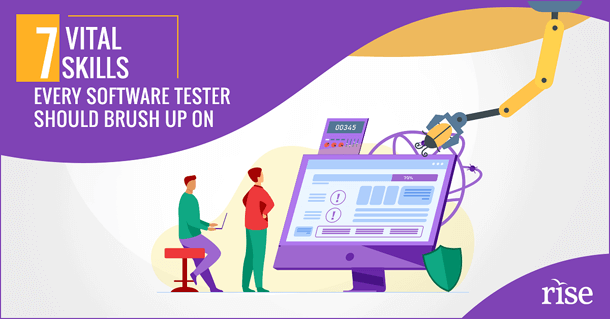

Software testing is one of the vital processes while developing modern applications.
The new-age project development methodologies such as Agile and DevOps are replacing the older waterfall model, eventually improving the IT service performance. Therefore, accelerated development and continuous deployments are the new norms. And, while they are getting even more complicated, testing is a critical activity more than ever.
If you’re thinking to kick-start career in software testing, then you’re at the right place.
Learning new things and adopting technical skills is inevitable to keep up with the trends and stay ahead of the competition. Through this article, we have curated the top 7 skills to become an effective software tester.
Let’s begin!
1. Sharp Analytical Thought Process
It is perhaps the most basic requirement to analyze the software requirements intricately. The systematic approach enables you to break down complex problems into smaller units to create various test cases and solve them in an easy step-by-step process. Therefore, a knack of analytical and logical application of concepts is essential for software tester.
2. Testing Tools and Technologies
It is imperative to possess knowledge of several testing tools and technologies as in the current age of agile; organizations are looking for speed as well as quality.
You do not need to master all the tools available in the market but should have familiarity with most widely used automation testing tools such as Selenium, Ranorex, and Watir. Moreover, you should be well-versed with different testing types, including system testing, black-box testing, unit testing, penetration testing, and more.
3. Software Development Life Cycle (SDLC)
SDLC provides you with insight into the software development process and helps anticipate prevalent complexities that might occur in the testing process. IT companies widely use some of the most common technologies, such as Scrum, Lean, and Kanban. So knowing these technologies will be an added advantage to perform better.
4. Documentation and Communication
Some of the testing processes require software tester to sit down for hours to analyze the software and monitor bugs. After that, it is necessary to create reports and documents to present it to stakeholders to keep track of all the changes in test processes, requirements, and trace deviations. Moreover, testers need to possess excellent communications skill to communicate effectively with team members, developers, and other stakeholders.
5. Process Automation
To become a software tester, while it is vital to have proficiency in manual testing, most of the time, it is good to rely on automation testing. Testers should learn automation skills as it provides higher accuracy for testing browser compatibility, performance, headless as well as database and integration layers. Additionally, automation test for cases saves much time whenever repetition occurs in a process.
6. Agile and DevOps
More and more IT organizations are adopting modern methodologies like DevOps and Agile to fulfill the “Quality at Speed” norm of software development. With the increasing complexity of the developing software and pressing demand to follow delivery deadlines, testers need to learn DevOps and Agile to promote iterative and collaborative working models.
7. Understanding of Coding
In the modern world of technology, a software tester must have basic knowledge of programming. Familiarity with coding provides an edge to identify and rectify errors in the application code.
Wrapping Up
These top seven skills are considered as exceptional when it comes to selecting candidates for software testing. However, being a fresher, you won’t be having all the skills in the most excellent form. We are here to help you! Enroll in the LearnATRISE exclusive Software testing training course today to gain hands-on practical experience under the guidance of experienced mentors.
We use cookies to deliver the best browsing experience as well as for analytics and marketing purposes. By continuing to browse this website, you accept the use of cookies. For more information, please visit our Privacy Policy